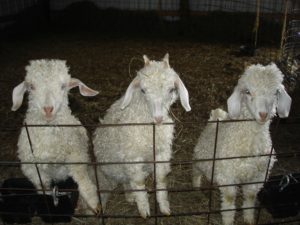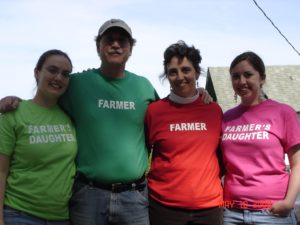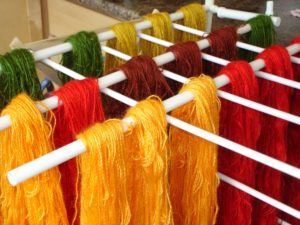From Hobby Farm to Farm Business: Laughing Goat Fiber Farm

Triplets, Peter, Paul and Mary are angora goats that can be found on the Ferguson’s farm. Photo by Lisa Ferguson
Lisa Ferguson has held a lifelong passion for knitting. Thus, when she and her husband Gary purchased a 48 acre parcel west of Ithaca, NY, 9 years ago, they put the land to quick use raising angora goats for fiber. Their goat raising venture started as a hobby, and for the past 5 years, they have been filing farm tax returns transitioning the hobby into a business. Along the way they have acquired farming skills and sought out business planning assistance.
The vision for Laughing Goat Fiber Farm was to raise exotic fiber animals and sell yarn. After realizing yarn sales would not generate sufficient returns, they have started producing finished goods, woven and knitted, and are considering agritourism opportunities as a way to bring customers to the farm. Lisa has been more actively marketing her yarns at the farm and community events and hopes to build a customer following via the farm website.
One of the joys of farming expressed by Lisa is that “you are always learning”. She and Gary value the connection to the land and the animals. As a suburban kid, Lisa takes pride in skills she learned out of necessity including basic veterinary skills and other animal husbandry practices to keep her herd healthy. Gary and Lisa enjoy being farmers and living in a farm community. They have made a commitment to keeping their land in agriculture by selling development rights to the Town of Ithaca. The permanent easement keeps their land in farming forever.

Nancy, Gary, Lisa and Marion Ferguson are posing before the first Country Fiber Farm Tour in 2009. Photo by Lisa Ferguson
Both Lisa and Gary work full-time off the farm so they are at times frustrated that their progress on business development has been slow. But, they are learning along the way and look forward to devoting more active time to the business in the future when they retire.
The current operation includes a mixed herd of 45 fiber animals, including angora and cashmere goats, sheep and alpacas, along with some ducks. The farm provides 10 acres of pasture, and includes 30 tillable acres where hay is produced and used by a neighboring dairy farmer. Farm infrastructure includes a carriage house used for equipment storage, a pole barn that provides animal shelter in winter, and small movable shelters set up in paddocks where animals graze. Currently off-farm income pays for farm investments. In the future, they hope the farm will pay for itself.

The Fergusons dye this 100% mohair yarn in their kitchen with food coloring and vinegar. Photo by Lisa Ferguson
Lisa and Gary have been actively working on their business plan, being careful not to overextend themselves, yet they remain focused on their vision. Initially they took a business-planning course offered by a community bank; however, they found it not so useful because it lacked an agricultural focus. In 2008, Gary and Lisa attended a 4-part Introduction to Farming Course offered by Cornell Cooperative Extension as part of the NY Beginning Farmer Project. The course was structured so that each week a farmer presented his/her story about how they got started, what they learned and how long it took to become “profitable”. Lisa said that the course provided a useful “reality check” and inspiration. To a word, each of the farmer presenters said it took 7 years to build their farming enterprise to where it generated more than it absorbed in money. So, even though Lisa and Gary feel their progress is slow, they are on par with other start-up farming operations.
Since taking the Intro to Farming class, Lisa and Gary have been working with NY FarmNet business consultant, Jeff Perry, to develop their farm business plan. Lisa feels the planning process has helped them consider ways to grow their business and it has provided the discipline needed to move forward with business planning. In the future they envision expanding their herd to as many as 100 goats, offering more on farm tours, building a shop for retail sales, hosting classes, and perhaps developing a farmstay opportunity. They are ideally located close toIthaca on a main route that provides both retailing and agritourism opportunities.
One of their biggest challenges has been balancing animal management demands with marketing demands, especially with full-time jobs. In recent years Laughing Goat Fiber Farm has been a stop on Cooperative Extension organized Fiber and Farm Trail tours. This has brought family visitors to the farm and created connections to knitters. Lisa has also ventured into off farm sales at community festivals that draw big crowds providing exposure and sales. Her website is not getting a lot of action, but she anticipates it being more important in the future. Facebook and Twitter are also being used to generate brand recognition and customers.
In considering what advice to give to other beginning farmers, Lisa says, “don’t borrow money, be patient, and don’t be afraid to make mistakes.” She recommends business planning as a way to assess opportunities for business growth and stay focused.
To learn more about Laughing Goat fiber farm, visit their website.

